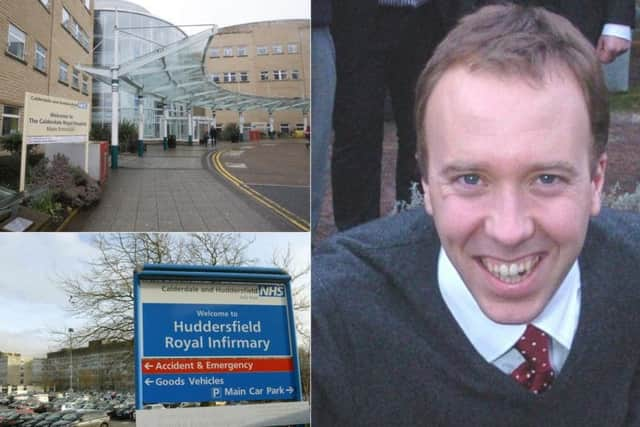Matt Hancock: Time to reboot the NHS with a technology upgrade
I started my working life in a tech business. My first job was solving the Millennium Bug in a start-up that takes postcodes and turns them into addresses – you may have used it to speed up your online shopping.
And I’ve spent most of my Ministerial career driving the proper use of digital technology. From transformation of parts of Government technology to promoting the use of technology across the economy to legislating to protect us from the new risks it brings to child safety and privacy.
Advertisement
Hide AdAdvertisement
Hide AdNow I intend to bring that knowledge and experience, and frankly my unsurpassable enthusiasm for tech, to Britain’s health and social care system.


I love the NHS. It’s been there for me – as it’s been there for us all – at some of the most difficult moments in my life. The NHS has saved the lives of my close family, and has cared for family and friends in their hour of need. I want the best for the NHS, and will do all I can to make that happen. We are increasing the NHS budget by £20bn by 2023-24 to guarantee the NHS for the long term.
But money alone is not enough. We need to make the most of that money.
And the NHS is at the same moment the world’s biggest opportunity for saving lives through modern technology, and the world’s most frustrating place to work for its IT. The power of genomics plus AI to use the NHS’s data to save lives is literally greater than anywhere else on the planet. Yet our hospitals operate dozens of systems that don’t talk to each other. GPs, social care, pharmacies and community care are on different systems.
Advertisement
Hide AdAdvertisement
Hide AdSystems crashing is a regular occurrence. In cyber security there have been improvements since the WannaCry attack, but this still needs work and board-level attention. The social care system is not at all integrated, when its integration is vital.
The NHS is one of the biggest buyers of fax machines on the planet. And it’s clunky, clunky, clunky.
In many parts of many NHS trusts, workstations have two screens – not because they are as cutting edge as a City trading desk but because they have two separate computer systems running side by side.
Staff waste hours logging on, transcribing vital clinical data by hand or over the phone, the systems are slow, fail to communicate with each other, fail to reconcile accounts and identities and rely on expensive, out-of-date badly managed contracts with low-grade suppliers which don’t understand the core business they’re intending to support.
I could go on.
Advertisement
Hide AdAdvertisement
Hide AdAnd the net result is not just scarce resources wasted but countless hours of clinical staff spent trying to work broken systems, patients being given sub-optimal care because the systems didn’t communicate and ultimately lives lost.
But bad though this picture is, it’s even worse than this. Much worse. Because the standard against which we should measure the NHS’s tech is not just the current systems working better, but the best that technology could offer the NHS. And against this standard we are falling even further behind – the gap between where we could be and where we are is wide and getting wider. Our doctors, nurses, GPs, pharmacists, our patients, should all have easy access to the best tools that technology can give them.
Only then will we know that we are making the most of our wonderful NHS staff, and offering the very best care of the nation.
For most staff the IT they use every day should be easier and meet their user needs, not be an additional burden they need to be extensively trained for.
Advertisement
Hide AdAdvertisement
Hide AdLike good tech elsewhere, we need technology that makes life easier for hard-working and often over-stretched staff. We need technology that can run basic tasks and processes more efficiently.
This will save the NHS money and free up staff time – money and time that can be better used to provide great care.
I expect every board in the health and care system to grapple with this agenda and back the people doing the transformation. I am determined to make this happen – for the sake of the millions who work in health and social care and for the 50 million people in this country who rely on them in their hour of need.
Matt Hancock is the Health Secretary. This is an edited extract of a speech he gave at NHS Expo 2018.